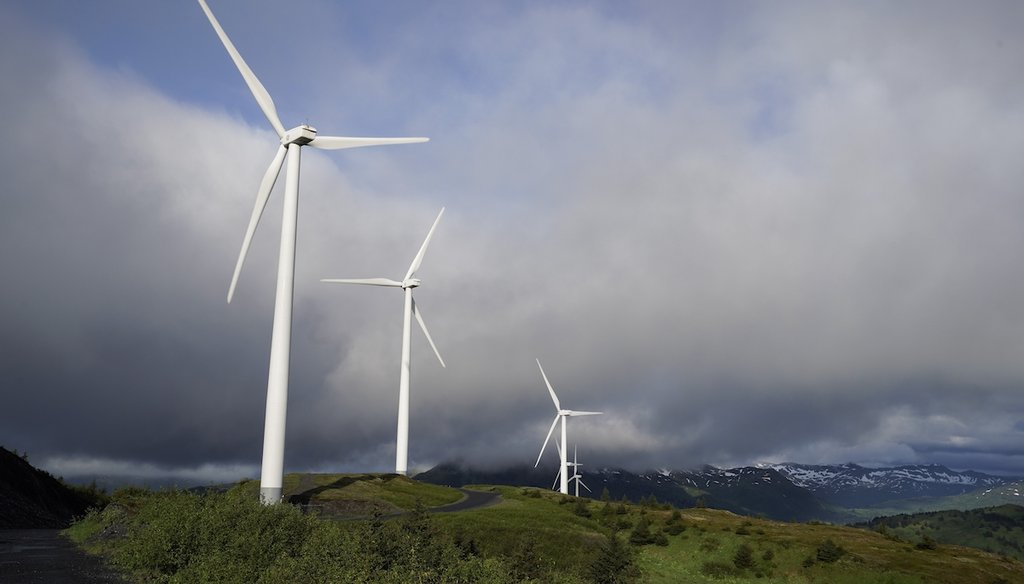

Our only agenda is to publish the truth so you can be an informed participant in democracy.
We need your help.


Wind turbines work on June 25, 2023, in Kodiak, Alaska. (AP)
A study by energy industry experts showed that an average wind turbine generator lasts around 25 to 75 years.
A spokesperson for the wind farm mentioned in the post said its wind turbine generators are expected to last around 20 years.
Let’s clear the air. Do wind turbine components deteriorate in just three to four years?
A Sept. 25 Facebook post claimed that a "wind farm in Mt. Pulaski" is replacing generators in all its wind towers after just three and a half years.
"So evidently the life span on the generators on these things appears to be just about 3 to 4 years. It takes 12 semi trucks and trailers, A 9 axle 500,000 pound crane, A 100,000 pound crane and 12 pick up trucks to change each generator," its caption said. "That is a huge amount of diesel fuel being used to maintain these wind towers."
(Screenshot from Facebook)
This post was flagged as part of Meta’s efforts to combat false news and misinformation on its News Feed. (Read more about our partnership with Meta, which owns Facebook and Instagram.)
The claim also gained hundreds of likes on X. We found the same text posted on Facebook as far back as May 2022.
"The claim that a wind turbine generator lasts three to four years is not correct," Matt Shields, National Renewable Energy Laboratory senior offshore wind analyst, told PolitiFact.
Wind turbines convert wind energy into mechanical energy, and wind generators convert that to electricity. The U.S. Environmental Protection Agency said wind turbines typically last 20 years and require routine maintenance every six months.
The Electric Power Research Institute and the National Renewable Energy Laboratory published a June 2023 study that analyzed operational data from existing wind turbines. It showed an average generator annual failure rate of around 1% to 4%, Shields said.
"In other words, there is a 1(%) to 4% chance that the generator fails in any given year during its operation. Converting that to (the) lifetime of the generator corresponds to an average wind turbine generator lasting around 25 – 75 years," Shields said.
Wind farms usually last 25 to 30 years, he said, and that life span stands to get longer while the industry "learns more about effective operations and maintenance strategies."
Shields said that all machines, including wind turbines, need maintenance to remain operational. But "just because a machine is being serviced doesn’t mean that it is at the end of its lifetime," Shields said.
Several factors can affect a generator’s life span, including frequency and quality of maintenance, quality and maturity of the installed design, and site-specific turbine operational conditions.
According to the U.S. Wind Turbine Database, as of May 2023, there were four wind turbine projects in Mount Pulaski, Illinois: HillTopper, Whitney Hill, Radford’s Run, and an unknown project in Logan County.
Matt Epting, media and public relations manager for Enel North America, a renewable energy company, told PolitiFact that the photo in the post shows HillTopper. Asked about the claim, the spokesperson said its wind turbine generators typically last around 20 years.
Enel replaced the gearbox, not generators, in 17 of HillTopper’s turbines in 2022 because of unforeseen and rare defects in equipment provided by a third-party manufacturer, the spokesperson said.
Christopher Niezrecki, mechanical engineering professor at University of Massachusetts, Lowell, said components that are damaged due to weather or that wear prematurely because of defects would need repairs and replacements.
"Some generators and gearboxes and other components do need replacement but I have never heard that they need replacement (over) 3-4 years," Niezrecki said.
Niezrecki also pointed out that other forms of energy are "much worse" on a life-cycle basis compared with wind energy. PolitiFact previously reported that a wind turbine generally produces in months, not years, more energy than was needed to manufacture it.
A post claimed that wind turbine generators only last three to four years.
But an analysis by energy industry experts found that generators have an average annual failure rate of around 1% to 4%, meaning a typical wind turbine generator lasts around 25 to 75 years.
We rate this claim False.
Facebook post (archived), Sept. 25, 2023
X post, Oct. 26, 2023
Facebook post, May 20, 2022
Email interview, Matt Shields, senior offshore wind analyst of the National Renewable Energy Laboratory, Oct. 27, 2023
Email interview, Mark Diesendorf, former associate professor and deputy director of the Institute of Environmental Studies, University of New South Wales Sydney, Oct. 27, 2023
Email interview, Melanie Sattler, chair of the civil engineering department at University of Texas at Arlington, Oct. 29, 2023
U.S. Environmental Protection Agency, Renewable Energy Fact Sheet: Wind Turbines, August 2013
Electric Power Research Institute, Wind Turbine Generator Reliability Analysis To Reduce Operations and Maintenance (O&M) Costs, June 2023
Email interview, Christopher Niezrecki, Distinguished University Professor of Mechanical Engineering at University of Massachusetts Lowell, Oct. 27, 2023
PolitiFact, A wind turbine can produce in months, not years, more energy than was needed to manufacture it, July 28, 2023
Search on U.S. Wind Turbine Database
Enel Green Power, HillTopper Wind Farm, USA, accessed Oct. 26, 2023
Email exchange with Matt Epting, media and public relations manager for Enel North America, Oct. 26, 2023
USA Today, Fact check: False claim that wind turbine generators only last 3 to 4 years, Aug. 15, 2022
Australian Associated Press Fact Check, Wind turbine lifespan claim generates misinformation, Oct. 13, 2022
In a world of wild talk and fake news, help us stand up for the facts.
